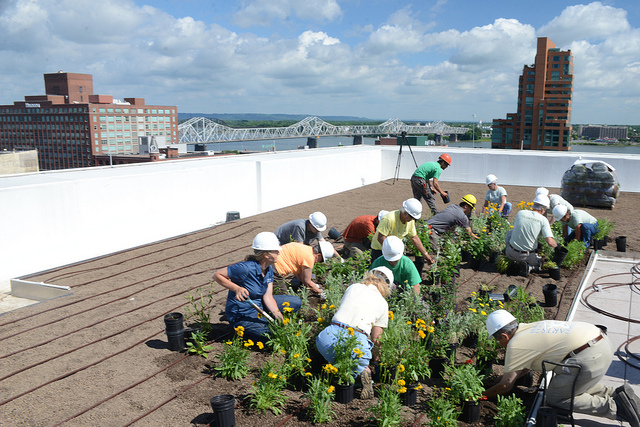With growing concern for the environment, energy conservation has become increasingly popular. People everywhere have been making strives to reduce their carbon footprints and the University of Louisville is no exception. Several buildings and building extensions on campus have been certified with the Leadership in Energy and Environmental Design (LEED) Green Building Rating System (TM).
Some of these LEED-certified buildings include the School of Dentistry, the School of Business’ Equine Adddition and the Student Recreatin Center. Some buildings under construction or design that have been targeted for the LEED certification are the Center for Predictive Medicine Addition, the renovation of the Student Activity Center’s East Wing and the new Soccer Stadium. The most recent certification was awarded to the The Nucleus Innovation Park.
On October 23 of last year The Nucleus Innovation Center opened on Market Street, adjacent to the business and medical districts. The Nucleus building was awarded a silver LEED certification by pursuing specific prerequisites of efficiency. The building was constructed with local low-emittion materials from within the region. In order to reduce heating and cooling costs the building is constructed with concrete that has a higher reflectivity rate. Water and energy reductions have been made throughout as well as reductions in construction waste.
The Nucleus building is a University of Louisville Foundation initiative that offers Eco-friendly lab and office space. This eight-story, 200,000 square foot building is the first multi-tenant building to open downtown in 20 years. Their tenants include InnovateLTC, a business acceloator, Regenerex, a cell-therapy development corporation, and Pharmaron, a pharmacieticls company. Tenants are given access to programs, resources and funding opportunities that nurture the innovative minds of each company’s team of researchers.
Not only is this building a good house for development but it is also an example of a self-sustainable environmentally friendly work place. Justin Mog, Assistaint to the Provost for Sustainabiliy Initiatives, explains that the building contains many key features that make it so self-efficient. “There are bike racks, reductions in electricity and water use, and smarter heating and ventilation system,” states Mog. Mog describes each room as having motion detection lights and carbon monoxide detectors to detect a presence in each room. The lights cut down on electricity usage and the carbon monoxide detector adjusts the temperatures in each room to reduce heating and cooling costs, but their most attention grabbing feature is the green roof.
The green roof is a vegetated roof, complete with patio tables and chairs for a view over the city. “The black roofs and pavement absorbs heat and the temperatures and the core of the city is much hotter than the surrounding areas,” says Mog, describing the urban heat island effect. This roof was important due to the fact that Louisville is one of the highest contributors to the urban heat island effect. The natural lndscaping reduces the amount of heat absorbed by the city and the building. “It holds excess moisture, helps the building reduce heating and cooling needs and provides a place for the local wildlife,’ says Mog.
Nucleus was established in 2008 by the University of Louisville Foundation with the goal of making the University of Louisville a premier metropolitan research university. Currently Nucleus is assisting in UofL’s Health Science Campus “focusing on health care and aging care,” states Mog. Through the close proximity of companies and new intelligence collaboration among researchers has taken place.
The corporation not only provides a healthy economic atmosphere for entrepreneurs but also provides business management and consulting services. The Nucleus Innovation Center is only the first of four research and economic development buildings planned to be constructed. Within the next 20 years Nucleus’ projects are expected to grow research, nurture new opportunities and recruit healthcare and life sciences business. They are projected to be supported by $2.3 billion in capital investments and create 8,700 new, high-paying jobs. From initial concept evaluation to product development, Nucleus drives innovation not only through Louisville but Kentucky and the surrounding region.





